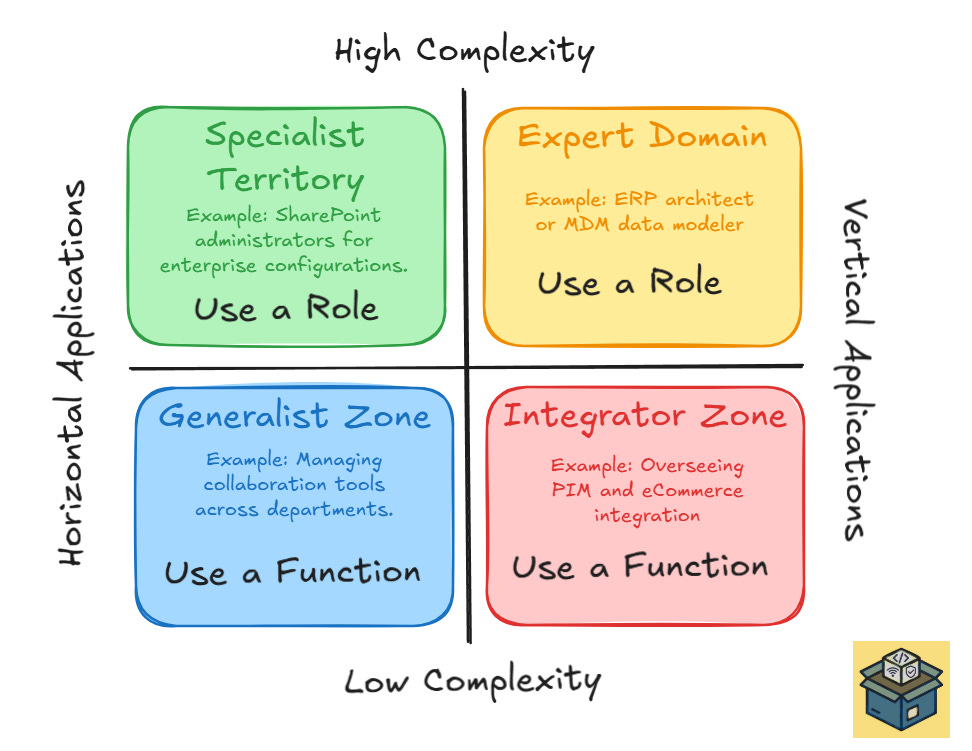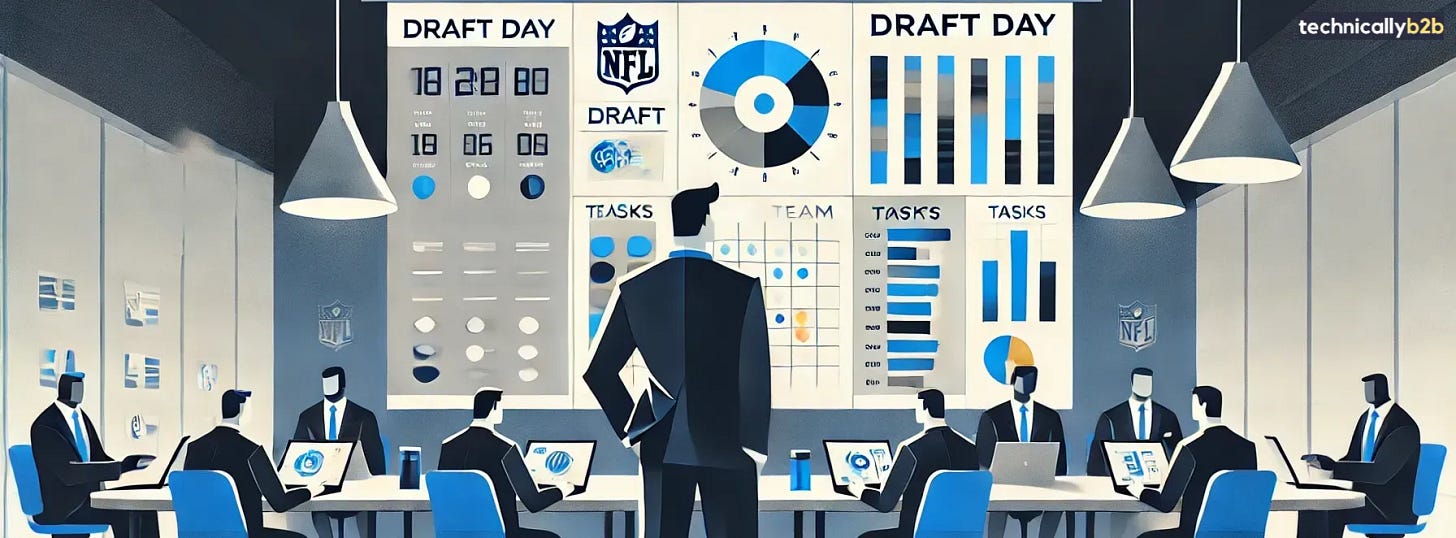Functions vs. Roles: A Blueprint for Midmarket IT Talent Strategy
Re: How to do more with less...
TL;DR
Your org chart is not a strategy, and if you are filling seats instead of defining functions, you are already behind. In lean IT teams, broad functions let a few people cover a lot of ground, which is fine until complexity creeps in. A Unified Collaboration Administrator juggling multiple platforms? That works. A single person owning your entire ERP? That is a disaster waiting to happen. IT leaders need to stop treating roles like checkboxes and start building teams that scale. Get it wrong, and you are either burning people out or setting yourself up for a high-stakes failure.
I was recently catching up with an old colleague who now leads IT at a manufacturer. Since we just flipped the page on 2024, the conversation of yearly budgeting was bound to come up. A statement was made that went, almost verbatim, like this:
“I've got [redacted] down my neck about a lot of buzzwordy things. But I can barely keep the lights on with the current team and budget is looking flat."
Sound familiar? Take a look at r/sysadmin and posts like this are non-stop:
This is the story of our lives for most IT leaders. A constant juggling of ambitious business demands with skeleton crews and tight budgets. But here's the thing - after spending 15+ years in the trenches, I've learned that working smarter isn't just about grinding harder.
It's about being intentional with how you structure your team.
One of the most powerful levers you can pull? Deciding whether to organize around functions or roles. It sounds simple, maybe even obvious, but I've seen this single decision make or break IT organizations.
Let me explain.
Functions vs. Roles
Think about your typical IT department that’s somewhere between 1-75 FTEs.
You might have that superhuman solo IT “Director” who somehow keeps 200 applications running while also being the de facto help desk, security team, and digital transformation guru. They're wearing so many hats they could open a haberdashery.
That's a function-based approach - broad responsibilities rather than narrow specializations.
On the flip side, I recently worked with a company that hired a dedicated PIM (Product Information Management) specialist. Despite being a relatively small organization of 350 employees, they knew their product data was their lifeblood. They needed someone who could eat, sleep, and breathe PIM.
That's a role-based approach - narrow responsibilities with hyperfocus.
Neither approach is inherently better and it's all about context. But let’s take a look at when each are better applied.
Functions Shine When...
You're running lean and mean.
Most mid-market IT departments are working with that magical "less than 5% of total headcount" budget. Functions let you cover more ground with fewer people.
At one point in my career, we created a "Unified Collaboration Administrator" function instead of separate roles for being the custodian of SharePoint, Zoom, and Box. One person owned the entire collaboration stack. Not only did it save money, but it also meant better integration between tools and a single point of contact for the business.
Organizations have a LOT of applications, platforms, and technology to support.
It simply does not make sense to have a 1:1 ratio of owner:technology in most environments even with infinite resources. That being said, this isn’t a matter of making individuals a jack-of-all-trades or a specialist. They CAN be both and have a T skillset within reason. In fact, I would encourage it.
Roles Make Sense When...
The cost of failure is too high to ignore.
Sometimes, you need someone who lives and breathes a particular system. Think about your core business systems. For example, your ERP system that handles thousands or millions in employee transactions daily? That needs someone who understands every quirk and configuration. I've seen companies try to save money by having a generalist manage their ERP, only to spend triple on consultants when things go sideways.
In non-digitally born B2B organizations, it’s typical to only have 2-8% of total revenue going through an ecommerce platform, but you’ll find out very quickly how important that platform is when it’s down for a day. You can't afford to have that managed by someone who's also juggling infrastructure maintenance, handling graphic design, or trying to fix that broken printer in the warehouse.
The Practical Reality
If you’re staring at a fork in the road, you should almost always start with functions, but be ready to pivot to roles when the pain points become clear.
Watch for these signals:
When your generalists are spending more time googling solutions than implementing them
When system downtime starts impacting revenue and significant operational stability
When your business users are crying out for expertise you can't readily provide
Think Like a GM (General Manager):
Just like NFL teams have to balance their roster under a salary cap, you're working with finite resources. You can't field specialists everywhere, but you also can't win with just utility players. The key is identifying your "impact positions" - the systems and platforms where specialized expertise directly translates to business success.
The Platform Factor
Now, let's talk about platforms - because they complicate everything in the best possible way. You've got your horizontal tools (think Microsoft 365, the digital equivalent of oxygen) and your vertical applications (like that ERP system that runs your entire business).
In my experience, horizontal platforms usually play nice with a functional approach. Your collaboration tools, basic infrastructure - one capable generalist can usually handle it. But vertical applications? That's where it gets interesting. Platforms with a higher impact to order to cash or procure to pay processes, or that impact a significant amount of business users most often need dedicated roles as they grow in complexity.
Here’s how that gets mapped out visually if we were to put them into quadrants mapped by Application Type and Complexity:
The Million Dollar Question
So how do you decide?
Let me share a quick exercise I’ve used to help. Grab a whiteboard (or your digital equivalent) and let's map this out:
List your critical systems in two columns:
Revenue impact (what directly affects the money)
Business operations (what keeps things running)
For each system, jot down:
Current support model (who handles it today)
Number of weekly incidents/requests
Last major outage impact ($$$)
Compliance requirements
Integration points with other systems
Put a star next to anything where your gut clenches when you think about it failing. Trust me, your instincts here matter.
Here’s a basic example to get the wheels turning:
In a roundabout way, I end up doing this as a part of my role when solutioning the implementation of digital commerce platforms. Typically, ERP systems jump out immediately as a high risk area, so we discuss who supports the platform today, how resilient it is, etc. Having your ERP go down is pretty shitty for operations inside your business, but it’s even worse when directly integrated to your public facing website - your dirty laundry is showing for a lot of people to see.
The beauty of this exercise is its simplicity. You'll likely find 2-3 areas that scream "I need a dedicated role!" while others are perfectly fine under your current functional approach. You’ll then be able to tie the gaps to strategic initiatives in the company for justification (or at least a chance at it).
Remember, this isn't about transforming your entire organization overnight. Start with your biggest pain point, make the change, and learn from it.
Evolution beats revolution every time in IT leadership.
Wrapping Up
That former colleague I mentioned left our exploratory conversation with a different outlook on how he may be able to repurpose current individuals who have slowly slid into a niche role that isn’t having an impact on the business. A necessary duty for any leader.
Remember, this isn't a one-time decision. The best IT leaders I know constantly reassess based on changing business needs, available talent, and yes, those ever-present budget constraints.
What's your take? I'd love to hear how you're handling this balance in your organization. Drop a comment below - are you team Function, team Role, or somewhere in between?







